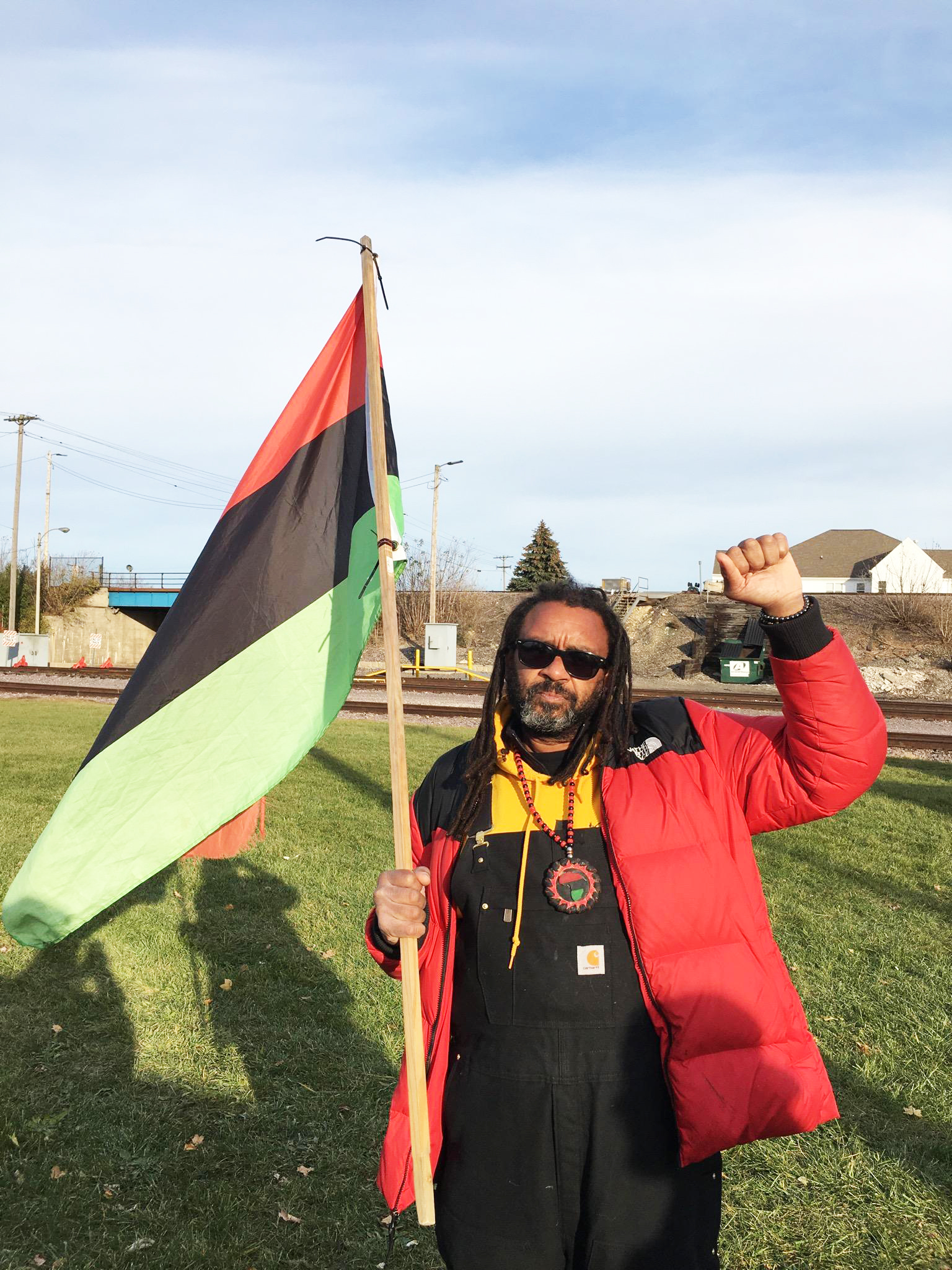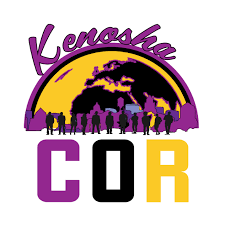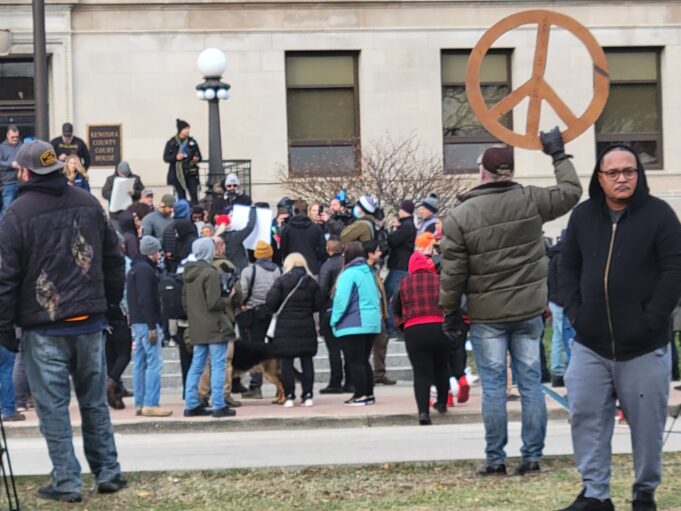By William P. Muhammad
KENOSHA, Wis.—Lost in the passion, protests and politics in Kenosha, Wisconsin, is the impact these stressors can often have on Black and Brown youth. They often had to navigate isolation, ostracism or indifference and bear the brunt of a society in flux even prior to the national spotlight cast on the fourth largest city in the state.
“Sometimes people like to start arguments with you, they like to try to mistreat you,” said Keithon Harris, a 15-year-old student and resident of Kenosha when describing how living in the city effects young people. He shared how a friend of his is facing 60 years in prison for unknowingly driving with a firearm in a family member’s car. The teen said police also often harass many youths on a regular basis.
“They’ll target you and watch you for a couple days, trying to find something to arrest you for. We all think it’s not right that (Rittenhouse) got away with that. If that was a Black person, he would have gotten life (for) it,” said Keithon Harris.
Some residents of Kenosha and even folks outside the city expressed stunned amazement when a jury found 18-year-old Kyle Rittenhouse, a White Illinois resident who killed two White men and wounded a third with an assault-style rifle, not guilty of all five charges against him on Nov. 19.
Mr. Rittenhouse was reportedly protecting local businesses after two days of protests surrounding the 2020 police shooting of Jacob Blake, a young Black man now paralyzed from his injuries. His acquittal presents questions regarding vigilante justice as an increasingly armed populace becomes more divided and dissatisfied over issues of government accountability.

The acquittal of Mr. Rittenhouse also raises questions about the ongoing fight for justice for Blacks and police accountability.
“The Blake’s have thick skins, our family has been fighting for justice for African American people since 100 years ago,” said Justin Blake, uncle and spokesman for his nephew whose shooting by local police sparked the initial days of protest which drew Mr. Rittenhouse and other counter-protestors to the city.
“My grandfather was a Tuskegee Airman, my great-grandfather on one side was a Pullman Porter and the other great-grandfather on my father’s side was a Garveyite, so we know what the struggle is all about. We don’t take this lightly and this is something built into our DNA,” he said of his family’s will to continue the fight for justice.
Regarding the relationship between Kenosha’s Black community and local White establishment, Justin Blake explained that decades of injustice and neglect created a highly charged and combustible atmosphere in the community before Officer Rusten Sheskey fired seven shots into his nephew, severely wounding him in front of his three children.
“It just got to be too much,” Justin Blake told The Final Call regarding the community’s reaction to the shooting and the district attorney’s failure to file charges against the officer in question. “So, when they saw the vicious attack upon my nephew, it drove them to ‘enough-is-enough,’” Mr. Blake said.
When the aftermath of the shooting attracted protestors for and against the incident from across the region, activists said a deadly brew of anger and rage ensued as an impassioned Black community demanded justice while a cross-section of others clashed with police and armed civilians. Local and state groups also stepped to the forefront.
Bringing hundreds of people from across the city and the state in support of the Blake family, organizations such as All of Us or None Wisconsin and the Kenosha Coalition Organizing Resolution (KCOR) helped propel the Jacob Blake shooting into the national and international spotlight after a seemingly unending string of police killings of unarmed Blacks across the country.
“We helped organize to get down to Kenosha to stand up and stand with Kenosha from Milwaukee,” said Minister Caliph Muab-El, president of All of Us or None Wisconsin and a member of KCOR.
They were instrumental in bringing caravans of demonstrators to the city last year to demand accountability in solidarity with the Blake family. “As far as the people who were shot by Kyle Rittenhouse, there was a lot going on. Gaige (Grosskreutz) was a medic with The People’s Revolution to make sure the people had adequate medical attention as a result of protesting because we were being hit by both National Guards and White supremacist groups,” he said in an interview with The Final Call.
“There was tear gas, pepper spray, smoke bombs, there (were) people throwing bleach in the air and there was a lot of antagonism.”
Stating that control of narratives is vitally important to mass movements or demonstrations, Caliph Muab-El argued agitators infiltrated the crowd and escalated an otherwise peaceful rally from one of passion into one of pandemonium, effecting court proceedings a year later with a not guilty verdict. “It’s a fact that they always deploy provocateurs. As a matter of fact, there are people who get paid to do that. We, the Moors, ran them out of Milwaukee two weeks before Jacob Blake and during the George Floyd uprising. And after we ran the provocateurs out of Milwaukee, there was no more looting, no burning of buildings or anything like that,” he said. “We know without a doubt or a contradiction they were the faces we knew and recognized. They were in Kenosha.”

Between aggressive police tactics toward a Black population of slightly more than 10 percent and the political steering of narratives portraying Black youth as the primary source of crime, Tanya McLean told The Final Call that young people in the city are angry and upset. Ms. McLean is executive director and founder of Leadership of Kenosha (LOK). She said young people are also not necessarily grasping the magnitude of what is happening around them and how local and national politics affects them.
“That’s why we’re really pushing to have more dialogue with young people about the importance of what’s happening in this time and culture right now,” Ms. McLean, a psychotherapist and educator, continued.
Being truthful and open with young people helps them to see the bigger picture and shows that their voices matter, said Ms. McClean. “It’s going to be their responsibility to continue this fight, even though they don’t want it, even though they didn’t ask for it, this is our reality and if we don’t stand up for ourselves, nobody will,” she said
What must be also considered in the ongoing pursuit of justice in Kenosha and other places around the country is the often overlooked and underappreciated program of the Honorable Elijah Muhammad, as taught by the Honorable Minister Louis Farrakhan, explained Student Minister William Muhammad of Mosque No. 3 in Milwaukee. He said the Rittenhouse verdict is a wakeup call to the time and what must be done.
“It’s absurd that anyone would go into a protest carrying a semi-automatic weapon and then be found not guilty of all charges,” Student Min. Muhammad said. “But the Honorable Minister Louis Farrakhan has taught us through his own example that we should always be able to view events from the frame of reference of the perspective of God and what God is doing here,” he added.
One of the signs of the unraveling of a great nation is the dismantling of its systems, particularly its justice system,” explained Student Min. Muhammad.
“So now, White people are experiencing in a major trial what we are consistently experiencing and been experiencing in this country. There is 100 percent dissatisfaction, and this brings 100 percent change.”













